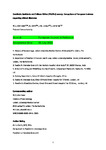Paediatric Residents and Fellows Ethics (PERFEct) survey: Perceptions of European trainees regarding ethical dilemmas
| dc.contributor.author | den Boer, MC | |
| dc.contributor.author | Zanin, A | |
| dc.contributor.author | Latour, Jos M | |
| dc.contributor.author | Brierley, J | |
| dc.date.accessioned | 2021-08-06T10:29:47Z | |
| dc.date.issued | 2021-08-24 | |
| dc.identifier.issn | 0340-6199 | |
| dc.identifier.issn | 1432-1076 | |
| dc.identifier.uri | http://hdl.handle.net/10026.1/17408 | |
| dc.description.abstract |
<jats:title>Abstract</jats:title><jats:p>With an increasingly complex healthcare environment, ethics is becoming a more critical part of medical education. We aimed to explore European paediatric trainees’ experiences of facing ethical dilemmas and their medical ethics education whilst assessing their perceptions of ethical dilemmas in current and future practice. The Young Sections of the European Academy of Paediatrics and European Society of Paediatric and Neonatal Intensive Care developed an explorative online survey covering demographics, ethical dilemmas faced and ethics training. The survey was made available in nine languages from November 2019 to January 2020 via newsletters and social media. Participants (<jats:italic>n</jats:italic> = 253) from 22 countries, predominantly female (82%) and residents (70%), with a median age of 29-years, completed the survey. The majority (58%) faced ethical dilemmas monthly or more frequently. Most ethics training was received by ethics lectures in medical school (81%) and on the job (60%). A disagreement between the healthcare team and patient/family was the most frequently faced moral dilemma (45%); the second was withholding/withdrawing life-prolonging measures (33%). The latter was considered the most challenging dilemma to resolve (50%). Respondents reported that ethical issues are not sufficiently addressed during their training and wished for more case-based teaching. Many have been personally affected by moral dilemmas, especially regarding withholding/withdrawing life-prolonging measures, and often felt inadequately supported.</jats:p><jats:p><jats:italic>Conclusion</jats:italic>: Paediatric trainees face many moral issues in daily practice and consider that training about managing current and future ethical dilemmas should be improved, such as by the provision of a core European paediatric ethics curriculum. <jats:table-wrap><jats:table><jats:tbody> <jats:tr> <jats:td colspan="2"><jats:bold>What is Known:</jats:bold><jats:italic>• Paediatric services are becoming more complex with an increase in ethical dilemmas asking for rigorous training in ethics.</jats:italic><jats:italic>• Ethics training is often lacking or covered poorly in both pre- and postgraduate medical education curricula.</jats:italic><jats:italic>• Existing ethics training for European paediatric trainees is haphazard and lacks standardisation.</jats:italic></jats:td> </jats:tr> <jats:tr> <jats:td colspan="2"><jats:bold>What is New:</jats:bold><jats:italic>• The PaEdiatric Residents and Fellows Ethics (PERFEct) survey provides insight into the European paediatric trainees’ views regarding ethical dilemmas in their current and future practice.</jats:italic><jats:italic>• European paediatric trainees report a lack of ethics training during paediatric residency and fellowship.</jats:italic><jats:italic>• This study provides content suggestions for standardised medical ethics training for paediatric trainees in Europe.</jats:italic></jats:td> </jats:tr> </jats:tbody></jats:table></jats:table-wrap></jats:p> | |
| dc.format.extent | 561-570 | |
| dc.format.medium | Print-Electronic | |
| dc.language | en | |
| dc.language.iso | en | |
| dc.publisher | Springer (part of Springer Nature) | |
| dc.subject | Ethics | |
| dc.subject | Training | |
| dc.subject | Paediatrics | |
| dc.subject | Medical education | |
| dc.subject | Perceptions | |
| dc.subject | Physicians | |
| dc.title | Paediatric Residents and Fellows Ethics (PERFEct) survey: Perceptions of European trainees regarding ethical dilemmas | |
| dc.type | journal-article | |
| dc.type | Journal Article | |
| plymouth.author-url | https://www.webofscience.com/api/gateway?GWVersion=2&SrcApp=PARTNER_APP&SrcAuth=LinksAMR&KeyUT=WOS:000687912300001&DestLinkType=FullRecord&DestApp=ALL_WOS&UsrCustomerID=11bb513d99f797142bcfeffcc58ea008 | |
| plymouth.issue | 2 | |
| plymouth.volume | 181 | |
| plymouth.publication-status | Published | |
| plymouth.journal | European Journal of Pediatrics | |
| dc.identifier.doi | 10.1007/s00431-021-04231-8 | |
| plymouth.organisational-group | /Plymouth | |
| plymouth.organisational-group | /Plymouth/Faculty of Health | |
| plymouth.organisational-group | /Plymouth/Faculty of Health/School of Nursing and Midwifery | |
| plymouth.organisational-group | /Plymouth/REF 2021 Researchers by UoA | |
| plymouth.organisational-group | /Plymouth/REF 2021 Researchers by UoA/UoA03 Allied Health Professions, Dentistry, Nursing and Pharmacy | |
| plymouth.organisational-group | /Plymouth/Research Groups | |
| plymouth.organisational-group | /Plymouth/Research Groups/Institute of Health and Community | |
| plymouth.organisational-group | /Plymouth/Research Groups/Plymouth Institute of Health and Care Research (PIHR) | |
| plymouth.organisational-group | /Plymouth/Users by role | |
| plymouth.organisational-group | /Plymouth/Users by role/Academics | |
| dc.publisher.place | Germany | |
| dcterms.dateAccepted | 2021-07-31 | |
| dc.rights.embargodate | 2021-10-6 | |
| dc.identifier.eissn | 1432-1076 | |
| dc.rights.embargoperiod | Not known | |
| rioxxterms.versionofrecord | 10.1007/s00431-021-04231-8 | |
| rioxxterms.licenseref.uri | http://www.rioxx.net/licenses/all-rights-reserved | |
| rioxxterms.licenseref.startdate | 2021-08-24 | |
| rioxxterms.type | Journal Article/Review |


